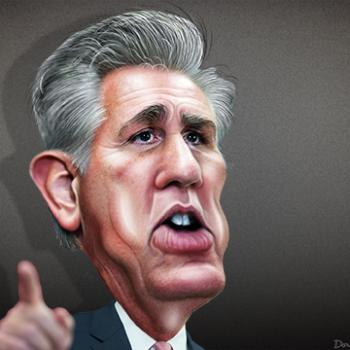
The dignity of work is intricately linked to the dignity of the worker. Work for work’s sake is idolatrous. Work is meant for a purpose, which is, to help with the common good, a good which is to include the needs of the workers themselves. If a worker does not get their proper share of the common good, or if work does not contribute to the common good, but subverts it, as happens when many rich employers exploit workers, then the value of the work is significantly lessened if not entirely eliminated. This is why slavery cannot be said to be good, for though it has people do some kind of work, it is exploitive work which gives the worker no rights of their own, no sense of human dignity. Every worker must be given their proper, just due, and if those who employ them do not do so, workers should be free to respond, such as unionize, in order to make sure their dignity is restored. The cry of the oppressed, the cry of the worker whose dignity is ignored, can also be said to be the cry of Christ, for what is done to the poor and needy, to those whose lives have been unjustly treated, is done to him (cf. Matt. 25:45). James properly understood this when he wrote:
Behold, the wages of the laborers who mowed your fields, which you kept back by fraud, cry out; and the cries of the harvesters have reached the ears of the Lord of hosts. You have lived on the earth in luxury and in pleasure; you have fattened your hearts in a day of slaughter. You have condemned, you have killed the righteous man; he does not resist you (Jas. 5:4-6 RSV).
One of the accomplishments of the incarnation is to set the oppressed free. The God-man has joined himself in solidarity with the poor, the widow, the orphan, the foreigner, those whose human dignity and rights have been ignored. Exploitation of the poor, exploitation of the worker, is exploitation of Christ, which is why James can say that such exploitation is directly responsible for the death of the righteous man, that is Christ.
The worker, the laborer, should reap the proper and just rewards of their labor. “It is the hard-working farmer who ought to have the first share of the crops” (2 Tim. 2:6 RSV). If that is denied them, they have a right, indeed, a duty to cry out and demand justice. They should not be satisfied by being told work is a value in and of itself, meaning, that the work they do is reward enough. We must not use the dignity and value of work to subvert the dignity and value of the worker. Work is for the sake of the worker, not the worker for the work. This is why, when workers see they are being exploited, when they see their options are to either let themselves be worked to death, or fight against exploitation, they should fight against their exploitation. When they do that, they prove they are not lazy. They are engaging a greater work thanks to their resistance to exploitation. Those who would subvert their right by using the government to force them to be exploited or have all their human needs left unmet if they do not allow themselves to be exploited show that they are willing to sacrifice the innocent poor for the sake of the greedy rich and powerful. If they justify it by saying work is a good which must be promoted, they are using a truth to undermine the truth itself, for they have made work more important than the worker, indeed, they have turned it into an idol.
Sadly, the rich, wanting to get richer, do so on the backs of the poor and needy. They use the labor force to exponentially increase their own wealth, giving the worker less than their fair share of the work product. When they find the poor will not want to work for them, because the poor do not want to be exploited, the rich find and use many in governmental positions as a tool to have the government come in and help them get the labor they want. Sometimes, they do this by finding ways to expand who can be seen as eligible to work, which we see happening now with efforts to expand the use of exploitive child labor, as Harm Venhuizen indicated in the Associated Press (5-25-2023):
Lawmakers in several states are embracing legislation to let children work in more hazardous occupations, for more hours on school nights and in expanded roles, including serving alcohol in bars and restaurants as young as 14.
The efforts to significantly roll back labor rules are largely led by Republican lawmakers to address worker shortages and in some cases run afoul of federal regulations.
Indeed, we see that Kim Reynolds already signed such a bill, making it the law in Iowa, as reported by Gloria Oladipo in The Guardian (5-27-2023):
Iowa’s Republican governor, Kim Reynolds, has signed a bill that rolls back several child labor law protections in the midwestern state, including how many hours children can work and at what type of establishments.
For the sake of the rich, because they want to keep the costs of labor low, children are now seen as fair game in many states. How long will it be that instead of being an option, it will be seen as mandatory for poor children to go to work, saying that they should work instead of go to school?
Many of the social justice advances of the early 20th century are being repealed, and they are being repealed by Republicans in Republican states. As such social justice advances expanded protections serving the dignity of the worker, this means that their dignity is now allowed to be undermined and destroyed. Those Republicans who write such bills, or sign them into law, try to justify their actions by saying everyone needs to contribute to society. They likewise say that work is a good in and of itself, which is why they think forcing people to work, even if all the work available is exploitive, is justifiable. This, of course, shows how far they are from respecting human dignity. Human dignity is not based upon one’s contribution to society, but is inherent to the human person. Once that is ignored, then it is easy to ignore the plight of the workers, for their dignity is only seen in relation to their work not in relation to their existence.
Despite claiming to be pro-life, many Republicans are not interested in the inherent dignity of the human person. This is clearly seen in the way so many of them are quick to undermine workers’ rights. Indeed, this can explain why, in Texas, Republicans were upset when various local ordinance gave a shred of dignity to workers by allowing those laboring hard under the sun time to rest and get hydrated. Thus, they had a state law override those local ordinances, making sure, then, that construction workers and other similar laborers, do not get the breaks they need. Construction workers are being told their lives are meaningless, that they can be and should be told to work even if it kills them. Thus, Francisco Uranga and Erin Douglas, writing about the new law in The Texas Tribune (6-16-2023), said:
The law’s scope is broad but ordinances that establish minimum breaks in the workplace are one of the explicit targets. The law will nullify ordinances enacted by Austin in 2010 and Dallas in 2015 that established 10-minute breaks every four hours so that construction workers can drink water and protect themselves from the sun. It also prevents other cities from passing such rules in the future. San Antonio has been considering a similar ordinance.
Texas is the state where the most workers die from high temperatures, government data shows. At least 42 workers died in Texas between 2011 and 2021 from environmental heat exposure, according to the U.S. Bureau of Labor Statistics. Workers’ unions claim this data doesn’t fully reflect the magnitude of the problem because heat-related deaths are often recorded under a different primary cause of injury.
Republicans said that they made that law so that labor expectations would be consistent throughout Texas. Of course, if that was the only desire, then the Republicans could easily have expanded the local ordinances, making them the norm, instead of undermining them. What they have done is promoted the exploitation of labor. The legislators who passed it have no interest in pursuing and preserving the dignity of the worker. Their lives literally are being sacrificed. The ordinances were made to help the worker. Those who were getting sick from exhaustion, due to harsh working conditions, were not able to rest, either on the job, or at home afterward; instead, they were told they have to continue to work, such as what Hannah Levitan said happened to Mario Ontiveros on Texas Public Radio (6-16-2023):
Three years before Dallas implemented its rest-break ordinance in 2015, Ontiveros lost feeling in his arm after painting high school stadium stairs for more than 10 hours in 112-degree heat, he told Public Health Watch through a translator.
“The other workers called paramedics and I was rushed to the hospital, where I spent seven days battling tendonitis,” Ontiveros, 61, said. “Aside from the physical and emotional trauma of recovering from an illness exacerbated by extreme heat, I was out seven days of work, with no help from work to pay my medical bills.”
While doctors recommended that he stay home to recover, Ontiveros said it wasn’t financially possible. He spent several years in physical therapy but said he still has to be careful, especially in the heat. “It’s changed my life,” he said, “but I’ve had to learn to deal with it …”
When the dignity of the worker is ignored, when they are being told they must go to work or perish, then they can be and will be exploited, and they will find their work will contribute to their own destruction. This was the dilemma of many workers in the 19th century. In the 20th century, there was great concern to change it, to make sure workers were respected and given basic, fundamental rights, as can be seen, for example, in various social justice encyclicals. Indeed, it was because of this interest to promote the worker, unions were able to be formed and given power. Sadly, as we have had decades of many trying to undermine or destroy unions, they have not been able to do as much good as they did in the early 20th century.
The attack against unions has prominently been done by members of the GOP, and as a result, with the decline of union power, the exploitation of workers has once again commenced, often backed by the government. When rich employers know that their labor pool has little to no right to human dignity, they will exploit that pool. They know that if one worker will not do as told, someone else, who has come into extreme need since the social safety net has been removed, will do so. And, if a particular worker is exploited so much that they are broken down, and their lives destroyed, the employer knows the government will help them get another worker to exploit. Thus, while many will point out that work is an obligation or duty, they ignore the value of the worker, subverting it, ignoring, then, the point and value of work itself. For the dignity of work is not independent from the dignity of the worker, but comes from the worker. And even if one can say work is an obligation, that obligation comes with all kinds of rights:
While work, in all its many senses, is an obligation, that is to say a duty, it is also a source of rights on the part of the worker. These rights must be examined in the broad context of human rights as a whole, which are connatural with man, and many of which are proclaimed by various international organizations and increasingly guaranteed by the individual States for their citizens Respect for this broad range of human rights constitutes the fundamental condition for peace in the modern world: peace both within individual countries and societies and in international relations, as the Church’s Magisterium has several times noted, especially since the Encyclical Pacem in Terris. The human rights that flow from work are part of the broader context of those fundamental rights of the person (St. John Paul II, Laborem Exercens, ¶16).
When those rights are denied, then the obligation no longer exists. The obligation to work must not be seen independent from the obligation to protect the dignity and rights of the worker. Exploitation is never justified. Certainly, people should not be lazy, but work can be done in and through a variety of ways, indeed, as technology advances, and many kinds of labor will not be needed, new kinds of work, new ways of contributing to society will need to be accepted (after all, Christianity already showed this truth through the lives of solitary monks and nuns). In the future, what is deemed work, and how one earns income, will change, indeed, it must change, lest we find a large portion of society perishing due to the fact that traditional work will no longer be available. And, just like we see the beginnings of the effects of climate change affecting the world we live in today, and so must deal with them, we can see the beginning of the changes undergoing work happening before our eyes. Instead of going backwards, we must go forward, helping those who are hurt by those changes. The fact that many Republicans have no problem with exploitive child labor, or forcing laborers to work till their death, brings up the frightening possibility they will have no problem when their policies lead to mass deaths as the poor have no jobs, no income, no housing, no medical care. This, of course, must be resisted. It is utterly inhumane. It is demonic. Why is it, then, that so many promoting such exploitation are themselves Christian and suggest it is the outcome of their Christian faith? They should listen to the words of James. Their exploitation is the exploitation of the righteous one, that is Christ. The Christian response is not to justify exploitation, but to liberate the oppressed, to promote human dignity and make sure the common good is preserved, not just the interests of the rich.
Stay in touch! Like A Little Bit of Nothing on Facebook.
If you liked what you read, please consider sharing it with your friends and family!
N.B.: While I read comments to moderate them, I rarely respond to them. If I don’t respond to your comment directly, don’t assume I am unthankful for it. I appreciate it. But I want readers to feel free to ask questions, and hopefully, dialogue with each other. I have shared what I wanted to say, though some responses will get a brief reply by me, or, if I find it interesting and something I can engage fully, as the foundation for another post. I have had many posts inspired or improved upon thanks to my readers.

















